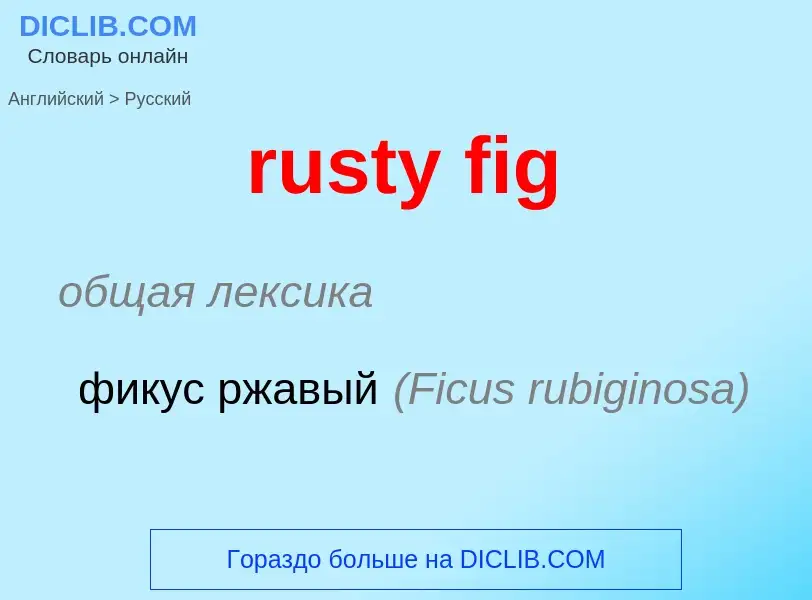Перевод и анализ слов искусственным интеллектом ChatGPT
На этой странице Вы можете получить подробный анализ слова или словосочетания, произведенный с помощью лучшей на сегодняшний день технологии искусственного интеллекта:
- как употребляется слово
- частота употребления
- используется оно чаще в устной или письменной речи
- варианты перевода слова
- примеры употребления (несколько фраз с переводом)
- этимология
rusty fig - перевод на русский
общая лексика
фикус ржавый (Ficus rubiginosa)
['fig|li:f]
общая лексика
фиговый лист
листок (часто перен.)
['rʌsti]
общая лексика
заржавелый
ржавый
нефтегазовая промышленность
покрытый ржавчиной, ржавый
прилагательное
['rʌsti]
общая лексика
покрытый ржавчиной
ржавый
заржавленный
цвета ржавчины
порыжевший
выцветший (о материи чёрного цвета)
отсталый
устаревший
запущенный
забытый
поражённый ржавчиной (о растениях)
норовистый (о лошади)
заржавленный, ржавый
прогорклый
норовистый (о лошади)
редкое выражение
хриплый
резкий
скрипучий
разговорное выражение
раздражительный
злой
сердитый
собирательное выражение
раздражительный, злой, сердитый
Википедия
.jpg?width=120)
Ficus rubiginosa, the rusty fig or Port Jackson fig (damun in the Dharug language), is a species of flowering plant native to eastern Australia in the genus Ficus. Beginning as a seedling that grows on other plants (hemiepiphyte) or rocks (lithophyte), F. rubiginosa matures into a tree 30 m (100 ft) high and nearly as wide with a yellow-brown buttressed trunk. The leaves are oval and glossy green and measure from 4 to 19.3 cm (1+1⁄2–7+1⁄2 in) long and 1.25 to 13.2 cm (1⁄2–5+1⁄4 in) wide.
The fruits are small, round, and yellow, and can ripen and turn red at any time of year, peaking in spring and summer. Like all figs, the fruit is in the form of a syconium, an inverted inflorescence with the flowers lining an internal cavity. F. rubiginosa is exclusively pollinated by the fig wasp species Pleistodontes imperialis, which may comprise four cryptospecies. The syconia are also home to another fourteen species of wasp, some of which induce galls while others parasitise the pollinator wasps and at least two species of nematode. Many species of bird, including pigeons, parrots, and various passerines, eat the fruit. Ranging along the Australian east coast from Queensland to Bega in southern New South Wales (including the Port Jackson area, leading to its alternative name), F. rubiginosa grows in rainforest margins and rocky outcrops. It is used as a shade tree in parks and public spaces, and when potted is well-suited for use as an indoor plant or in bonsai.

.jpg?width=200)


![As bonsai, [[Auburn Botanic Gardens]] As bonsai, [[Auburn Botanic Gardens]]](https://commons.wikimedia.org/wiki/Special:FilePath/Pjfigbonsai.jpg?width=200)
.jpg?width=200)

![''[[The Expulsion from the Garden of Eden]]'', by [[Masaccio]], before and after restoration. It was painted in 1425, covered up in 1680, and restored in 1980. ''[[The Expulsion from the Garden of Eden]]'', by [[Masaccio]], before and after restoration. It was painted in 1425, covered up in 1680, and restored in 1980.](https://commons.wikimedia.org/wiki/Special:FilePath/Masaccio-TheExpulsionOfAdamAndEveFromEden-Restoration.jpg?width=200)
![chaste]]" [[Pope]]s; later, most such coverings were removed. chaste]]" [[Pope]]s; later, most such coverings were removed.](https://commons.wikimedia.org/wiki/Special:FilePath/Mercury fig leaf.jpg?width=200)
